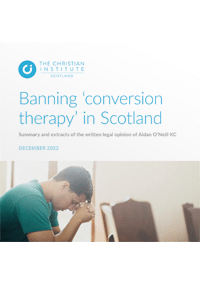The Christian Institute has reiterated its threat of court action if the Scottish Government goes ahead with a new law banning so-called conversion practices.
As the SNP/Green coalition publishes its consultation on the plans, the Institute’s Deputy Director for Public Affairs Simon Calvert said the scheme threatened freedom of speech and could criminalise the conversations and opinions of parents and church leaders.
The Scottish Government wants to outlaw ‘practices’ that seek to change, suppress or inhibit someone’s sexual orientation or gender identity. Activists are campaigning for this to cover “casual conversations”, “gentle, non-coercive prayer”. They even say children should be able to change gender without their parents’ consent.
Judicial review
Mr Calvert said: “We will be encouraging Christians to respond to the consultation and instructing a KC to look at the detail of the proposals.
“We are particularly worried about the Government’s plans for ‘civil protection orders’. The courts could impose draconian limits on the free speech of individuals based purely on activists’ speculation about what they might say to gay or trans people.
“Our solicitors wrote to the Government preparing the ground for judicial review in February 2022. If Parliament passes a law that tramples on basic freedom of speech and religion we are ready to go to court.”
Ban on prayer
Leading activist Jayne Ozanne says she wants “gentle, non-coercive prayer” to be covered by a ban, while spokesman for the End Conversion Therapy Scotland campaign Blair Anderson describes “depending on your parents’ consent” to change gender as “Conversion Therapy 101″.
Mr Calvert continued: “Gay and trans people are already protected, quite rightly, from verbal and physical abuse by existing law.
“Since those things are already illegal, what is it that this Bill seeks to criminalise? The activists are quite clear that they want it to target conversations and opinions they don’t like.”
Victoria
The Scottish Government’s approach has been informed by recommendations made by its own ‘Expert Advisory Group on Ending Conversion Practices’ and from the Scottish Parliament’s Equalities, Human Rights and Civil Justice Committee.
Both called on the Government to model its legislation on the conversion therapy law currently in force in Victoria, Australia, where, Mr Calvert explained, official guidance states that parents refusing to consent to their children going on puberty blockers are committing unlawful conversion therapy.
“Parents of gender-confused children in Victoria are now living in terror of being prosecuted for trying to protect their children from irreversible medical treatment.”
He added: “The guidance for ‘people of faith’ in Victoria directs Christians to pray in a way that contradicts the Bible’s teaching.”
Legal opinion
Mr Calvert concluded: “The Expert Advisory Group also claims that conversion therapy includes promoting ‘the importance of marriage’, and shockingly advocates the option of removing children from the home if their parents seek to caution them in the area of gender and sexuality.”
“In a legal opinion we commissioned in 2022, top KC Aidan O’Neill warned the Scottish Government that it will be exceeding its legislative powers if it pursues the Expert Advisory Group’s proposals. He also confirmed that such a far-reaching ban would criminalise innocent parents and preachers.”
Summary and extracts of the written legal opinion of Aidan O’Neill KC
The Christian Institute commissioned written legal advice from Aidan O’Neill KC in December 2022. This booklet offers a summary and extracts of the legal opinion received.
The publication of the consultation comes just a month after church leaders from different denominations wrote to the Scottish Government urging it to drop plans for a Bill banning so-called conversion practices.
More than 1,800 others have already signed the letter, including over 500 church leaders and pastoral workers.

Named person
It would not be the first time the CI has taken the Scottish Government to court.
In 2016, the CI won its long-running legal battle against the notorious ‘Named Person’ scheme, under which every child in Scotland was to be assigned a “named person” – an employee of the state to oversee their ‘wellbeing’ or ‘happiness’.
The first thing that a totalitarian regime tries to do is to get at the children, to distance them from the subversive, varied influences of their families, and indoctrinate them in their rulers’ view of the world.
Supreme Court Justices
The Institute spearheaded a legal action against the law, and in July 2016 the Supreme Court ruled that its key elements were unlawful and the scheme was eventually scrapped in 2019.




